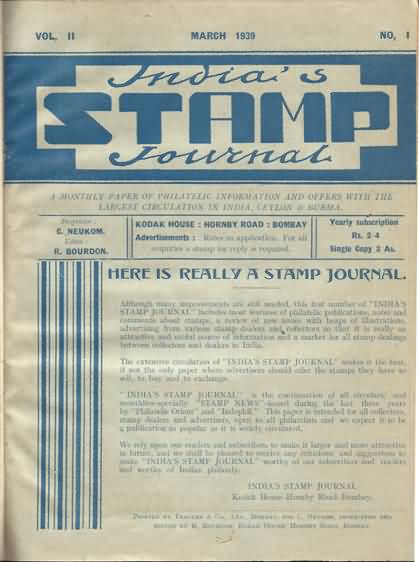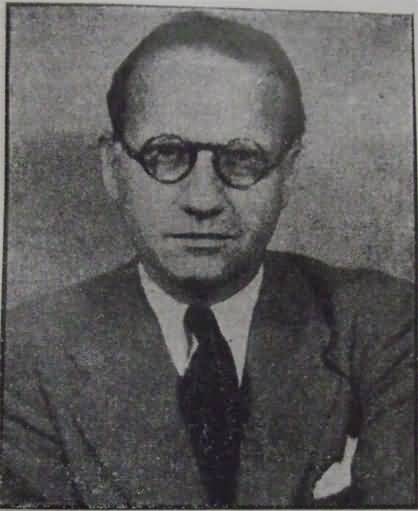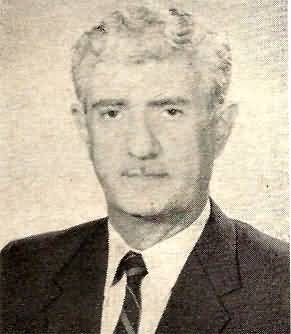Stamps of India: Article of the Month - April 2012
|
Origins of the India's Stamp Journal
by Madhukar and Savita Jhingan
We have spent about 5 years researching postal history of India in various archives in India and abroad. One of the file which came our way rather serendipitously was of two European stamp dealers migrating to India and setting up shop here. In this, our first philatelic history article, we focus on their arrival and founding of India's Stamp Journal. Carl Neukom, a wholesale stamp Dealer in Tehran, Iran wrote on March 3, 1936 to British Consul, British Legation, Teheran for a Visa for India and for a permission to live in India and establish their business in Bombay as stamp dealers for himself and his partner Roger Bourdon. They were largest exporters of the stamps of Persia/Iran and had decided to move due to new money restrictions in Iran that affected their business. The Acting British Consul, F Herbert Gamble, referred the matter to the Secretary to the Government of India in the Foreign & Political Department, New Delhi. Caroe, an officer in Foreign & Political Department noted on file on March 31, 1936, 'It seems that these two are philatelists. How a philatelist makes a living I do not know; the letter from Neukom does not make the objectives clear'. Neukom was a Swiss national holding passport # 388374/106 issued at Tehran on March 12, 1936 and Bourdon a French national was holding the passport # 13 issued at Tehran on March 4, 1936. Neukom was granted visa for India # 2738 on April 11, 1936 while Bourdon was granted the visa # 2720 on March 16, 1936. Both arrived in Bombay on April 25, 1936 by SS Versova. However the stay in India of Neukom was limited to one month as per visa granted to him. On May 11, 1936 Government of India decided to consult Government of Bombay for grant of permission to Neukom and Bourdon, to live in India. The file was also vetted by the Intelligence Bureau which cleared it on May 19, 1936, and Home Department of Government of India. The Consul General for Switzerland at Bombay wrote to revoke the one month limit clause on the visa granted to Neukom. The Commissioner of Police, Bombay also gave a 'no objection' on May 18, 1936. Government of India approved the removal of the limit of stay for Neukom's visa on June 26, 1936. Neukom and Bourdon established two firms, 'Philatelic Orient' at Kodak House, Hornby Road, Bombay and 'Indophil' with a postbox address for wholesale stamp dealing. Neukom was the proprietor of the Philatelic Orient while Bourdon took care of business at Indophil. From the very beginning the Philatelic Orient stocked stamps from all over the world in packets and sets, albums, accessories, books, and catalogs. Philatelic Orient published 'Hind' Stamp Album and promoted it as printed in India for Indian collectors. In June 1940 'Collecting Stamps' was first published and remained in print for several years through many editions and revisions. This title was acclaimed as specially written for Indian collectors showing philately from Indian point of view. Philatelic Orient also printed First Day Covers. Philatelic Orient as well as Indophil issued circulars periodically from 1936 to 1937. In 1938 they consolidated these in 'Philatelic Orient Stamp News' of which 6 issues was published. In March 1939 they changed the name to 'India's Stamp Journal' and published its first issue that however was inscribed Volume 2 Issue #1, to provide continuity to 'Philatelic Orient Stamp News'. Neukom was credited as the proprietor of 'India's Stamp Journal' and Bourdon was its editor. It was printed by Thacker & Company. 'India's Stamp Journal' claimed the largest circulation in India, Ceylon, and Burma with 2000 copies every month. Its price was 3 Annas per copy and Rs 2¼ for the annual subscription. The advertisement rates were Rs 25 per page. Each issue had several pages of advertisement of Philatelic Orient and one page from Indophil. Bombay Philatelic Company that was celebrating its golden jubilee in 1939 was a regular advertiser. Other regular advertisers were Coronation Stamp Company, Federal Stamp company, MA Paul, and Kurbanally Jafferalli. The classified advertisements were ½ anna per word with a minimum of Re 1. With the 8th issue in October 1939 the prices was reduced to 1½ annas per copy and Re 1 for the annual subscription. From the November 1939 issue the printing was done in house at Phil Press that was owned by Neukom with Bourdon as its Manager. Bourdon informed in the October 1939 issue, to his suppliers and customers that as he may be called to join the French Army during the World War II, he shall not transact any business during the war. That was the end of Indophil. However it seems that he wasn't called for the war duty and continued serving the philately in India.
The doyen of Indian philately, Jal Cooper, made an entry with front page advertisement in July 1939 issue. And in the very next issue not only did he continue to advertise but his piece 'Philately In India' was the lead story. His advertisements and writings continued to appear in all issues since. Jal Cooper eventually took over the 'India's Stamps Journal' as proprietor and editor with October 1940 issue. It continued to be printed at Phil Press till December 1942. It seems that Neukom and Bourdon separated by the end of 1942. And also ended at perhaps the same time the relationship between Neukom and Cooper with Philatelic Orient's advertisements stopped appearing in the 'India's Stamp Journal'. Bourdon as the Managing Director of Western Printers & Publishers took over printing the journal with January 1943 issue and continued till February 1950 when he 'ceased connections with that printing firm'. The firm however continued printing the journal till 1956. Jal Cooper wrote in July 1941 that the circulation was little over 200 copies, when he took over in October 1940, this appears more realistic as compared to the figures claimed by Neukom; and has since increased to over 700 copies. The size of the journal was also increased from 16 to 32 pages magazine and that too on better quality paper. Cooper was a legend in his own time and his name continues to command respect worldwide even today, four decade after his death in 1972. Cooper was a full time dealer since 1939 who gave equal attention to classics as well as inexpensive stamp packets for young. He managed a large space office stocked with not only stamps of all kinds, but also with catalogs, books, albums, and accessories from the leading brands from all over the world. In addition he ran successful public auctions as well as monthly postal auctions. He authored books on Indian philately which are till date the essential tools of the hobby. He founded Empire of India Philatelic Society and promoted India Study Circle in UK from its very inception. He held several philatelic exhibitions. And he published India's Stamp Journal that under his editorship was the voice of Indian philately. The work of Cooper can not be covered in a article like this but requires a whole book. Neukom mentions in January 1947 that his stamp business being offered for sale. However the evidence available shows that the Philatelic Orient remained in business at least till 1949. Neukom retired to Switzerland sometime before 1957. Bourdon, a bachelor, was still Bombay in 1957 running a printing press of his own. This must have been another press than the Western Printers & Publishers as he had left that in February 1950. We welcome more information on the life and time of the Philatelic Orient, Neukom, and Bourdon. Acknowledgments: National Archives of India, New Delhi Version 1.0, First published in Issue # 521 of May 3, 2012 of the Stamps of India Collectors Comapnion Version 1.1, May 14, 2012, Re-edited with additional information and images published on www.stampsofindia.com |
|||
| |
|||


